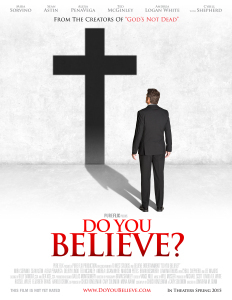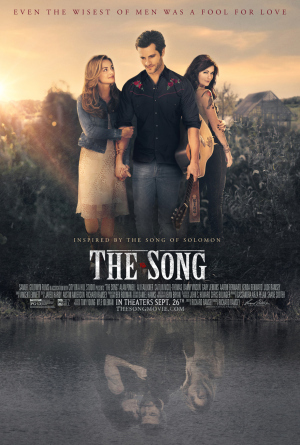Nate Fleming's Blog, page 29
March 24, 2015
Day 10 �����The 40 Days (and Nights) of Christian Media Challenge
 I’m one quarter of the way through this challenge. ��In other words, what I just did, I have to do again – three more times. ��30 days to go.
I’m one quarter of the way through this challenge. ��In other words, what I just did, I have to do again – three more times. ��30 days to go.
The good news is that I’ve fallen into a comfortable routine with my media consumption. ��I get up in the morning,��brew a cup of coffee, and hit Syke Jethani’s daily devotional. ��Then, I peruse Facebook, my email, and hit some of the Christian news websites.
On my way to work, I listen to one of the dozen Christian-made podcasts that I’m trying out. ��There’ve been a few clunkers, but I’ve found others��that really strike me as well-produced, entertaining, enlightening, even convicting. ��More to come about the podcasts later.
My big find this week was when I discovered that you can buy seasons of The Andy Griffith Show at different Christian retailers!�� So I have started to��allow myself an episode or two during the day. ��Some people may call foul, saying that Andy Griffith was not a Christian program. ��Technically, that is correct, but the rules I set up for myself stated clearly that I could only consume media that one could purchase at Christian retailers, so in my opinion I’m in the clear. ��Remember, one of the things I was attempting with this experiment was to better understand the people who consume��only Christian media every day for 365 days��a��year – and those folks would probably not have a problem with Andy.
 I also decided to go against the better angels of my nature, and download an “end-times” movie. ��I chose Pure Flix’s Revelation Road, which is sort of like God’s Not Dead meets Mad Max. ��And do you believe, I��was pleasantly surprised. ��The film had some good action, a premise that was not typical for these kinds of movies, and say what you will about the preachiness of his movies, but David A.R. White is immensely likable on screen. ��I still wouldn’t recommend the film to my non-Christian friends (still preachier than I prefer), but it made for some pretty solid “for-the-choir” entertainment.
I also decided to go against the better angels of my nature, and download an “end-times” movie. ��I chose Pure Flix’s Revelation Road, which is sort of like God’s Not Dead meets Mad Max. ��And do you believe, I��was pleasantly surprised. ��The film had some good action, a premise that was not typical for these kinds of movies, and say what you will about the preachiness of his movies, but David A.R. White is immensely likable on screen. ��I still wouldn’t recommend the film to my non-Christian friends (still preachier than I prefer), but it made for some pretty solid “for-the-choir” entertainment.
Next up on the list? ��Pure Flix’s Marriage Retreat.
I was also able to get hold of a very interesting little film, which I plan to write more about later. ��It’s called Rocket Pack Jack, and it’s a fun little (50 minutes) movie for kids. ��RPJ sports fairly impressive special effects, a good dose of humor, and quite a bit of on-the-nose Gospel talk that should have bothered me more than it did. ��Again, more to come later, but you can watch the trailer here.
Finally, I’ve felt stronger spiritually these past ten days, but I don’t think this is because I’ve been finding such strong and enriching spiritual content to consume. ��No, I attribute this mostly to my purposeful refocusing on my relationship with God, taking more time for prayer, and reading the Word.
The lesson I’m learning? ��While there’s some good in all the stuff that the Christian media machine tries to convince us to buy, in the end those things aren’t the things that will really help��us��to grow.

March 23, 2015
The Christian Response to Film Critics
 Remember last December, when Kirk Cameron put out the call to his fans to “storm the gates of Rotten Tomatoes” and help increase the audience score for his Razzie award winning film, Kirk Cameron’s Saving Christmas? ��It was Cameron’s��attempt to balance the critical reviews, which in the case of Kirk Cameron’s Saving Christmas, were abysmal. ��Thus, the Razzies.
Remember last December, when Kirk Cameron put out the call to his fans to “storm the gates of Rotten Tomatoes” and help increase the audience score for his Razzie award winning film, Kirk Cameron’s Saving Christmas? ��It was Cameron’s��attempt to balance the critical reviews, which in the case of Kirk Cameron’s Saving Christmas, were abysmal. ��Thus, the Razzies.
Unfortunately, for Kirk Cameron, his efforts backfired when word got out to those outside of��his fanbase. ��Having the faithful bring up the audience score was seen as gaming the system by many,��and they decided to do some storming of their own.����Suddenly Cameron��found his audience score bottoming out (currently 30%), and his reviews filled with all sorts of derogatory nonsense.
The most recent Christian-made film to be released was this weekend’s Do You Believe?, put out by Pure Flix, the same film company that brought us last year’s surprise hit, God’s Not Dead. ��As seems to be par for the course, the film has been receiving fairly negative reviews from the critics (currently 10% on Rotten Tomatoes) and overwhelmingly positive reviews from the core audience (currently 82%).
And predictably,��the Rotten Tomato plea��has gone out from the folks at Pure Flix to the faithful.
 In spite of what the anti-Cameronites��thought about Kirk Cameron’s efforts, I don’t see anything��wrong with encouraging your fans to rate and review your film. ��It’s grassroots campaigning, and say what you will about their films, but Christian-owned film companies are experts in grass roots campaigning. ��Pure Flix in particular has been hitting the core audience pretty hard these past few months. ��They’ve been using all sort of methods to��get people excited to see Do You Believe?,��posting pictures on Facebook, hosting��several advanced screenings for big fans, doing interviews all over the world of Christian media, all in an effort to build word-of-mouth excitement.
In spite of what the anti-Cameronites��thought about Kirk Cameron’s efforts, I don’t see anything��wrong with encouraging your fans to rate and review your film. ��It’s grassroots campaigning, and say what you will about their films, but Christian-owned film companies are experts in grass roots campaigning. ��Pure Flix in particular has been hitting the core audience pretty hard these past few months. ��They’ve been using all sort of methods to��get people excited to see Do You Believe?,��posting pictures on Facebook, hosting��several advanced screenings for big fans, doing interviews all over the world of Christian media, all in an effort to build word-of-mouth excitement.
It’s a given that the people who make up Pure Flix’s core��audience are��Christians. ��I think it’s also a pretty good bet��that they are��Christians who primarily interact with Christian media – watching mainly Christian-made films, listening mainly to Christian-made music, and reading primarily Christian-written books. ��Therefore, it stands to reason that Pure Flix would help nudge that grassroots audience in the right direction to increase the legitimacy and reputation of the film in the eyes of the world.
After all, don’t most of us feel like the critics are rarely right? ��If the critical score is low but the audience score is high, most of us will accept the audience score, because we’re audience, too. ��This means that if someone is on the fence about seeing a film, a high audience score might be just what it takes to nudge them into buying the ticket.
Having established that I don’t have a problem with the strategy of encouraging fans of a film to��rate and review a film on a site like Rotten Tomatoes, I will say that I do have��a problem with the attitudes��that many��Christians��show��to��the reviews of secular critics. ��While Do You Believe?’s Facebook page is full of glowing comments about the film from the die-hard fans, it’s also sprinkled with the victimized viewpoint that the disagreeing critics are��either evil, blind, or ignorant.
Here’s an example:
Please go to Rotten Tomatos and Post the Same review there as right now Only a couple positive ones are posted the majority have a Anti-Christian bent/agenda.
And another:
I can’t be surprised that critics knocked it. They are blinded by the ‘angel of light’ the counterfeit. However I thought it was incredibly impacting even a step above God’s Not Dead and I thought that was an awesome movie. These critics need a lot of prayer because I’ve watched movies they destroyed and I enjoyed them and those they rated so wonderfully absolutely horrible. Don’t give up the message will reach many.
And another:
I loved it. Go see it and decide for yourself dont be turned away by the ignorant critics reviews
I do believe that critic bias towards Christian-made movies exists. ��I’ve seen it with��the reviews of Mom’s Night Out, The Song, and Believe Me,��three films that were��– in my opinion��–��the most accessible Christian-made films of 2014. ��These three films deserved to be judged on their merits, and not the fact that they were being marketed to the faith-based audience. ��But if you read the reviews, it doesn’t take long for the anti-Christian-film bias to become��evident.
 Incidentally, even The Passion of the Christ��only has a Rotten Tomatoes score of 49%, and��oddly enough, the highest ranked Christian-made movie is Phil Vischer’s Jonah: A Veggietales Movie (69%).
Incidentally, even The Passion of the Christ��only has a Rotten Tomatoes score of 49%, and��oddly enough, the highest ranked Christian-made movie is Phil Vischer’s Jonah: A Veggietales Movie (69%).
The problem is, if a bias does exist, then it’s a bias of our own making. ��Christian-made and Christian-subculture-marketed films have been so preachy, so poorly made, and so Christian-subculture-focused for so long, that I don’t know when��secular critics will be��willing to give our films the benefit of the doubt.
We’ve made our bed and now we have to lie in it.
But here we are, living in an interesting time when our films are starting to become mainstream, playing alongside secular films. ��This is vastly different than the story with most of our books and music, which tend to stay firmly entrenched within the subculture walls that we build for them. ��Our movies have such potential to burst the Christian bubble, but only if we Christians don’t screw it up.
So far, it’s not looking good.
But I’m a hopeful person by nature, and so Christians, rather than calling foul or lamenting the spiritual deficiencies of people you don’t know, I have a few things��for you to understand that can help you become an intelligent player in the conversation, as our films gain legitimacy in the eyes of the world.
1) ��Film critics know their business.
 Get it? ��Critics are – by and large – professional journalists. ��While there are exceptions,��most of the critics you find represented on an aggregator site like Rotten Tomatoes have spent years studying and learning��film.�� It’s their job, just like it’s the job of the elementary schoolteacher to know 6th grade Mathematics, or the job of a endocrinologist to know hormones. ��To dismiss their criticism outright as some form of religious persecution or spiritual blindness is – in and of itself – ignorant, and in doing so you miss out on an opportunity for growth both for yourself and the filmmakers you are trying to support.
Get it? ��Critics are – by and large – professional journalists. ��While there are exceptions,��most of the critics you find represented on an aggregator site like Rotten Tomatoes have spent years studying and learning��film.�� It’s their job, just like it’s the job of the elementary schoolteacher to know 6th grade Mathematics, or the job of a endocrinologist to know hormones. ��To dismiss their criticism outright as some form of religious persecution or spiritual blindness is – in and of itself – ignorant, and in doing so you miss out on an opportunity for growth both for yourself and the filmmakers you are trying to support.
The fact is, if the movie has artistic or cinematic merit��then the critic will usually acknowledge that merit, regardless of the agenda of the film. ��We can actually see this in the current reviews for Do You Believe?, and the fact that most critics are saying things like��the movie is��well-filmed, Mira Sorvino’s performance is��effective, and the car crash at the end is impressive.
However, their job is to look at films critically (thus the name of the occupation). ��This means that they will clearly point out bad writing, plot holes, structural difficulties, unbelievable characterizations, and so on. ��Again, Christian filmgoers, understand that this is their job. ��And guess what? ��They actually don’t only score��Christian-made films in the low range. ��Currently, the��number one movie of the weekend was��Insurgent, and it��only has a 32% on Rotten Tomatoes. ��Sean Penn’s The Gunman has a 14% (and he’s *gasp* an agnostic liberal!), and Accidental Love (a film with a star-studded cast and extremely worldly subject matter) has a bottom-scraping 6%.
2) ��Practice contextualization.

Paul preaching at the Aeropagus
In missions, contextualization is the process of learning a new culture so that you can learn the best way to present the Gospel message to that culture in a meaningful way. ��Christian filmmaking, while not new, has become a new force in the cultural landscape, and��we must��learn that landscape – both as audience and artist.
How do we do that? ��We learn about quality of film by��watching acclaimed films that aren’t necessarily Christian. ��Since our films are playing alongside secular films, we must understand what makes secular films good so that we can make our own films better.
If you’re comparing the Christian film you’re watching to other Christian films, then you’re making the same mistake of those biased critics I mentioned above. ��You aren’t understanding the culture, and you’ll continue to find yourself both rejecting and being rejected by that culture. ��Sure, Scripture tells us being rejected is a part of being a follower of Christ, but that doesn’t mean we actively seek rejection by not learning the craft. ��Imagine if a doctor was proud that he was rejected for having patients die on his table, saying, “Jesus was rejected, and so am I! ��What a happy man I am!” ��It’s a ridiculous example, but it’s what happens so often for Christians regarding filmmaking.
I’m not suggesting that��a Christian��watch hours of R-rated material (although the rating should never be the sole arbiter of your decision process), because there are plenty of critically-acclaimed PG and PG13 rated films. ��Watch those films and pay attention to why they’re good. ��Read the reviews after you’ve watched to see why they are appreciated. ��Disagree if you will, but understand the critic point of view.
In other words, actively watch acclaimed films so that you can understand why people appreciate them, then you might come closer to understanding why our films get reviewed the way that they do.
3) ����Let the story be the message

blaineglobal.com
I’ll keep my final point simple. ��As you accomplish #2, I would hope that you would learn the importance of wanting more than just a good message in the films being made for you. ��Love the message, sure, but don’t stop there, demand well-told stories.
The clarion call is, “Support Christian movies so that we can send Hollywood a message!” ��But here is the problem: ��if the message you’re sending Hollywood is that we don’t care what you make for us as long as you include the message, then all you will get will be message movies, poorly made.
That should bother you, especially as you think about my first two points. ��But the point has been made over and over again on this blog, as well as other places, so I won’t belabor it.
—
Finally, with regards to Pure Flix’s latest call for improving the audience score on Rotten Tomatoes, the people that love the film should absolutely go and review and rate the film. ��But when you do, be prepared for two things:
First, don’t be surprised if the word gets out, and the haters do the same thing to Do You Believe? that they did to Kirk Cameron’s Saving Christmas. ��Just be prepared.
Second, when that happens, remember the message of the cross that the Pure Flix guys were trying to convey in their film, and respond to those haters the way that Christ responded to you when you came to him. ��Not with more hate, not with hostility, not with complaints of persecution and abuse, but with love, mercy, grace, and forgiveness. ��Same goes for the critics who may seem as hostile to our message as they are to the medium in which we present it.
Because when you think about it, it’s not our movies that will ultimately transform the cultural landscape – it’s when Christians truly act like Jesus to the rest of the world, especially in the face of rejection.

March 22, 2015
Day 8 ��� The 40 Days (and Nights) of Christian Media Challenge
I love the Sabbath, because it’s a good discipline to pull myself away from most media for most of the day.
An interesting thing happened today – I taught Sunday School for middle schoolers (we are part of a rotating team of teachers – we teach about once a month), and I felt like I had a lot more authority in my teaching than I’d had in the past. ��The sad thing is that it wasn’t because of the new Christian-made material I’d been taking in, but rather, because of the non-Christian material that I’d been avoiding.
Garbage in, garbage out… it’s a real thing, it would seem.
But I am still trying to consume nothing but Christian media for these forty days, and so the march continues. ����Thanks to the advice of a Facebook friend, I found a couple of more Christian Netflix sites:��www.iamflix.com and Morningstar Video. ��I’m hopeful that their streaming will work better than Parables.tv has been working, as living in China, streaming is always a challenge. ��I’m also happy to find that one of these streaming sites offers The Beverly Hillbillies. ��If I could just find The Andy Griffith Show on a Christian streaming site, I’d be set.
 I��did spend a good bit of the morning perusing reviews for the new Pure Flix film, Do You Believe?, and have not been surprised at what I have found: ��Christian reviewers praise the film, non-Christian reviewers pan the film. ��Big surprise there.
I��did spend a good bit of the morning perusing reviews for the new Pure Flix film, Do You Believe?, and have not been surprised at what I have found: ��Christian reviewers praise the film, non-Christian reviewers pan the film. ��Big surprise there.
Do you know what would make my day? ��My year? ��If a successful film company with a Christian mission (like Pure Flix) would shake it up a bit and release a film that breaks with��their formula,��a��film truly��aimed at non-Christian audiences. ��With their clout and budgets, they could potentially do something really cool.
But I suppose they must be hooked on simply preaching to the choir. ��It’s a pity.
A day with less media, Christian or otherwise….
It’s been a good day.

March 20, 2015
Unbroken: The Alternate Ending
 [Read to the bottom to find my faith-based alternate ending to Angelina Jolie’s Unbroken.]
[Read to the bottom to find my faith-based alternate ending to Angelina Jolie’s Unbroken.]
The 40 Days (and Nights) of Christian Media Challenge is on Day 7, and I’ve been pleased by some aspects of this journey (starting a daily devotional habit, discovering some interesting music, connecting with lots of fun people), and disappointed in others (that Christians have this weird fascination with copying the world’s fads, that the big players in Christian media��like perpetuating a pretty myopic view of the world, that if our stories don’t have specific “come to Jesus” moments, the Christian media marketers won’t touch them).
Ultimately, I’m finding that I don’t like or appreciate the various machines that exist in Christian media, but I don’t doubt that each machine��represents��lots of people who are doing their best to live faithful lives for Jesus.
One happy surprise I found was that Angelina Jolie’s Unbroken��is sold by Christian retailers. ��This surprised me, because it was a film made by a filmmaker who doesn’t appear to be a Christian, and (spoiler alert) it lacks a conversion sequence. ��My family sat down to watch the film last night, and like so many, we were touched by Louie Zamperini’s amazing life experiences, and the strength that he exhibited time and time again. ��The film handles issues of faith carefully and respectfully, which throws a bit of cold water on the idea that the movers and shakers in Hollywood have it out for Christians.
After the past week, I’d say that it’s more likely that the movers and shakers in Hollywood have it out for the corporate, industrialized, politicized Christianity that is so prevalent in America these days. ��And with good reason. ��Corporate Christianity can be��irritating, holier-than-thou, out-of-touch, unintentionally and imminently mockable. ��Corporate Christianity (like it’s secular brothers and sisters) loves to stir up controversy, to sensationalize for profit, and they love that the vast bulk of the faithful will eagerly swallow whatever pills they ship out to the neighborhood Christian bookstores.
The problem I have with the corporate side of my faith is that it runs so counter to the faith we’re called to in the Scriptures. ��Christianity is supposed to be relational, but Corporate Christianity is driven by profit – not people. ��Christianity is supposed to be about humility, but Corporate Christianity is about putting our stars up on pedestals to be loved and admired. ��Christianity is about loving your enemies, but Corporate Christianity is about��building bubbles so that we don’t have to interact with those who believe differently than we do.
Keep in mind, once again, I’m talking about the machine, not most of the people behind the machine. ��My interaction this past week with some of the people behind the machine is that they are doing their best to follow Jesus. ��Many of them are incredibly creative, and are just looking for ways to express that creativity. ��They are intelligent, passionate, and concerned for those people outside of the Christian faith in a sincere and loving way.
But back to Unbroken… watching Jolie’s film��got me thinking,��what if some��film company that produces films for the typical Christian audience had gotten their hands on��Louie Zamperini’s��story? ��A version that would have pleased the machine?
Just for kicks and giggles, I decided to imagine how that faith-based version of Unbroken��might have ended.
View this document on Scribd
In case the PDF doesn’t show up on your screen, you can also click this link:

Day 6 ��� Unbroken
 It’s late Friday night here in China, and I’m pretty tired. ��So I’ll just report that we enjoyed watching the Louis Zamperini movie, Unbroken.
It’s late Friday night here in China, and I’m pretty tired. ��So I’ll just report that we enjoyed watching the Louis Zamperini movie, Unbroken.
More to come tomorrow.
Do you believe? ��Me?

March 19, 2015
Day 5 of the 40 Days (and Nights) of Christian Media Challenge
 I decided��from the beginning of this��challenge to be honest in my daily reports. ��Whatever I was experiencing, I was going to record, for better or worse.
I decided��from the beginning of this��challenge to be honest in my daily reports. ��Whatever I was experiencing, I was going to record, for better or worse.
So, yesterday was on the worse side. ��Sorry about the downer. �� Today was much better.
Five observations for day five:
1) ��The tiny little men who live in the internet really do pay attention to what you do when you’re online. ��If you spend your time looking at a lot of Christian media, the tiny little men will notice and start shifting the adverts around until you get more and more adverts for Bibles and Chris Tomlin music, and fewer ads for Budweiser and Viagra. ��Thanks, tiny little internet men!
2) ��Watching streaming television or movies in China is more��frustrating than��sleeping on a bed with scratchy sheets and a couple of hungry mosquitos buzzing around in the room, while someone sits nearby in a squeaky rocking chair softly humming “Baby, Baby, Baby” slightly off key.
I wish I could download more Christian-made movies.
3) ��I’ve been spending a lot of time perusing online Christian bookstores these past five days, and I’ve decided that Christian consumerism is a funny animal. ��On the one hand, there are many wonderful products that are created and sold to build up and encourage followers of Jesus to be better followers of Jesus. ��On the other hand,��they say that��over half a billion dollars in Bibles alone are sold every year. ��Half a billion dollars. ��Just for Bibles. ��So, that would mean in my 12 year old daughter’s lifetime, over $6,000,000,000 of revenue has been generated in Bible sales alone.
The big business side of��Christianity��makes me feel just a bit icky, and this challenge is exasperating that feeling.
 4) ��I mentioned in my first post that I’m a big-time movie soundtrack guy, so these past five days��I’ve really been missing my Thomas Newman, Hans Zimmer, and Christophe Beck. ��But, I’ve actually found��a��Christian film composer whose work I like! ��His name is Ben Botkins, and you can hear some of his compositions on soundcloud. ��I found him because of his work on a recent indy Christian film about the life of Polycarp, called – wait for it – Polycarp.
4) ��I mentioned in my first post that I’m a big-time movie soundtrack guy, so these past five days��I’ve really been missing my Thomas Newman, Hans Zimmer, and Christophe Beck. ��But, I’ve actually found��a��Christian film composer whose work I like! ��His name is Ben Botkins, and you can hear some of his compositions on soundcloud. ��I found him because of his work on a recent indy Christian film about the life of Polycarp, called – wait for it – Polycarp.
Any Christian filmmakers out there looking for someone to score your new film? ��Give Ben a listen.
5) ��Christian filmmakers can make misleadingly good movie posters. ��This has caused me to begin watching several movies that I think will be decent based on the professionally produced movie poster, just to find out it was filmed on a hand held camera.
Yeah, Samson, I’m looking at you, bud.
Therefore, I recommend we��come up with a new ratings system for faith based films. ��Sure, the MPAA will make their own ratings if the film is released theatrically, but I think we need something to help folks like me understand what we’re getting before we put down our hard-earned coconuts.
My suggestions, which I propose should be called the Thimblerig Ratings System:
Rated N (newbies) – the film was made by newbies. ��Their hearts were in the right place, but they had no money, no training,��and it shows. ��Only watch if the filmmakers are your friends or relatives. ��Lots of overt Gospel talk.
Rated V (veterans) – the film was made by veterans, who were only just newbies a couple of ��years ago. ��They made a couple of trainwreck movies, and learned from their mistakes, managed to get some funding, and so they’ve improved. ��You still wouldn’t want to watch this film with anyone who isn’t also a die-hard Christian, but it’s a bit more entertaining for the choir. ��Still lots of overt Gospel talk.
Rated P (preachy) – the film is��pretty good technically, so they must have actually hired some professionals to be behind the camera.�� The film is still very��preachy, so unless your non-Christian friend really loves you, don’t show them this film. ��Still lots of Christianese being spoken, and lots of overt Gospel talk.
Rated A (amazing) – the film is amazing! ��The Gospel is there, but as in the parables of Jesus, you might have to work a bit to find it. ��The film is well acted, well scripted, well filmed, and well directed. ��You can freely take your non-Christian friends to see this film, and it will definitely provoke some good seed-planting conversation afterwards. ��There may be some non-family-friendly elements, but it services the story, so get over it.
And a special rating…
Rated HMJ (Help me, Jesus!)��– never mind about anything else, the writing in this film is so poor that you want to fill your ears with honey, cotton balls, and centipedes to avoid having to listen to the corny, canned, Christianese dialogue. ��I mean, the dialogue is��not even as good as the dialogue used by George Lucas in Star Wars Episode 2: ��The Attack of the Clones, and that’s saying something. ��Buy a copy of this film and then bury it deep in the ground.
That’s it for day 5. ��Tomorrow, I’m excited that my family and I get to watch Unbroken for Friday Family Movie Night! ��(available in Christian retailers! ��Yay!)
—
Nate is taking part in The 40 Days (and Nights) of Christian Media Challenge. ��Read about it here, and follow along for the next 35 days.
Follow Nate on Twitter, too. ��@RNFleming

March 18, 2015
40 Days (and Nights) of Christian Media ��� Day 4
 This is going to be a short report tonight. ��To put it lightly, day four was tough. ��I’m just ten percent of the way into the 40 Days (and Nights) of Christian Media Challenge, and today I hit a wall. ��For the first time,��I��felt like I couldn’t do this – just limit myself to the things produced by Christians for Christians, because the options were just so limited (especially living overseas) and so often poorly made.
This is going to be a short report tonight. ��To put it lightly, day four was tough. ��I’m just ten percent of the way into the 40 Days (and Nights) of Christian Media Challenge, and today I hit a wall. ��For the first time,��I��felt like I couldn’t do this – just limit myself to the things produced by Christians for Christians, because the options were just so limited (especially living overseas) and so often poorly made.
I know that yesterday I was finding the positives in the situation, saying something like “at least there are Christians who are creating,” but today I’m over that. ��Today, I’m thinking that just creating isn’t enough.
We need to be creating better and better things.
This is especially an issue for��those Christians out there who don’t see the big deal in what I’m doing because they only consume Christian media every day anyway.����There are three problems I see with creating such a bubble for yourself. ��First, this isn’t what we were called to do. ��“Go out into the world”, remember? ��How can we do that if we spend all our time in our Christian sub-culture bubble? ��Second, people in the bubble tend to get used to slapping the “Christian” label on everything, thinking that the label alone gives something value. ��But slapping a “Christian” or��“faith-based” label on something doesn’t automatically make that thing��good. ��Usually, it just sullies the label. �� Third, dealing specifically with filmmakers living in the bubble, I know of a few Christian filmmakers who never watch secular movies. ��My question for them is – if you don’t watch good films, how can you hope to create good films? ��I just don’t get that.
The thing that saddens me about all of this is that I know that there are so many talented Christian artists who could be making great media, great art, but they’re forced to tailor their work for those Christians living in the bubble, Christians who aren’t interested in being challenged by what they consume. ��Their audience��wants to grow spiritually, but they only want it to happen by having their beliefs reinforced. ��They want to be told that their interpretation of the Bible is the right one, that the idea they have about God is without error, and they’re uncomfortable with the idea of exposing themselves to alternative notions – or even looking at their own ideas in alternative ways. ��This means they aren’t necessarily experiencing growth of any kind, but more likely just��entrenchment.
And that depresses me on this, the fourth day.
So, with all this in mind, I feel like I’m having to push through this day like I’m ensconsed in some bizarre alien membrane. ��I’m trapped, trying to push my way out.
Today, Christian media is not making me feel free, but entrapped.
I’m hoping tomorrow will be a better day.

March 17, 2015
40 Days (and Nights) of Christian Media ��� Day 3

Anyone get why this picture is here? 20 points to the first person who can tell me in the comment section.
Here it is, the end of the third day of my challenge to consume only Christian media, and I’ve survived.
Not only survived, but I’ve actually learned something, I think.
I’m ashamed to say it, but taking part in��this challenge has brought home to me the obscene amount of media that I consume on a daily basis, without even realizing it. As if waking up from a dream, I clearly see now��that from morning until night, I’ve got somebody else doing their level best to manipulate or influence me in some way.
“Buy this product!��Be scared of this threat!��Believe this ideology!��Curse this leader!��Praise this celebrity!��Think like I do! Achieve!��Agree!��Purchase!��Comment! Consume!”
 The craziest thing about this is that just a few years ago, we were taking in��a fraction of the media that we consume now. Growing up in the 70’s and 80’s, we had four television stations, a morning newspaper, a collection of books, magazines, and records, and on the occasion��of something really good to see, an infrequent��trip to the cinema.
The craziest thing about this is that just a few years ago, we were taking in��a fraction of the media that we consume now. Growing up in the 70’s and 80’s, we had four television stations, a morning newspaper, a collection of books, magazines, and records, and on the occasion��of something really good to see, an infrequent��trip to the cinema.
Now, we carry all of those things around in the device in our pockets.
And we’re constantly staring at the little screen.
And taking in the noise of it all.
Having nothing but Christian media to consume has forced me to turn my back on 95% of the noise, and my subconscious desire to see the vacuum filled has been foiled��time and time again these last three days. It’s certainly not been from a lack of trying, but from a lack of��much to interest me coming from the world of Christian media.
 Yes, I have found some things that I like. ��I’ve enjoyed listening to a few good podcasts (Steve Brown, etc; More Than One Lesson; Christ and Pop Culture); I’ve started what seems to be an interesting novel (The Green Ember by S.D. Smith); I watched��The Song (read my review here); and I began��developing the habit of waking up every morning to Skye Jethani‘s daily devotional – which also includes a good reading of Scripture.
Yes, I have found some things that I like. ��I’ve enjoyed listening to a few good podcasts (Steve Brown, etc; More Than One Lesson; Christ and Pop Culture); I’ve started what seems to be an interesting novel (The Green Ember by S.D. Smith); I watched��The Song (read my review here); and I began��developing the habit of waking up every morning to Skye Jethani‘s daily devotional – which also includes a good reading of Scripture.
I’ve also spent hours wading through all sorts of Christian media that hasn’t interested me in the least. ��Some, because of the content, and most others because of the quality, or lack thereof.
But I think this has been a good thing. ��Even though there’s not much to interest me, I have been impressed by how many��Christians are still out there creating. ��This, I believe, is to be celebrated. ��Rather than just consuming the noise, they are trying to create something that offers a counterpoint to the noise.
After all, there is the off chance that God will��do what He did so often in Scripture, and use our weakness to show his strength, and even our often unimpressive media to draw people to Himself. ��Does that mean He desires us to make bad media? ��Of course not. ��Might it mean that He wants us to do our best, depending on Him along the way? ��I think so.
Yes, God uses some pretty foolish things and pretty inadequate people to point��others��to Himself. ��Who knows? ��He might even be using��this blog! ��Wouldn’t that be something?
To celebrate that idea, I leave you today with one of my favorite songs by one of my favorite singers (Christian or otherwise). Enjoy, and be about the business of being creative – no matter what you do.
By the way, I’d just like to point out that it’s been about one year since I published my first novel, Thimblerig’s Ark. ��My own attempt to create a counterpoint to the noise. ��I’d love to hear what folks think about it!

March 16, 2015
The Song ��� Thimblerig’s Review
I just watched The Song.
And I’m angry.
I don’t remember the last time I had such a visceral reaction to watching a film. ��I mean, the credits are rolling, and I just want to punch the��wall. ��I want to hurl my glass into the��fireplace. ��I want to take a 2×4 and shatter the windows of the cathedral I’m building.
Why? ��What could possibly make me so angry about a film?
It’s simple. ��I’m angry that��a��film that is so inspiring, so challenging, so authentic, so brave, so introspective, and��so enjoyable��hasn’t been seen by more people, while lesser films – both Christian and secular –��thrive.
Make more money than they should.
Win $100,000 awards for being inspirational that they simply don’t deserve.
I suppose if King Solomon were asked to comment on this situation, he would throw his hands in the air and quote himself from Ecclesiastes 1:2: “Meaningless! ��Meaningless! ��Everything is meaningless!”
You should try it sometime. ��It really does put things into perspective, doesn’t it?
But seriously, I loved The Song. ��I really, really loved The Song. ��As you read this review, I hope that this sentiment comes across louder than my anger over my sense of injustice (okay, maybe “injustice” is too strong a word) that the film hasn’t been seen by everyone. ��And I hope that reading this blog will encourage you to put this film on your Netflix queue��to be watched sooner rather than later.
Trust me, you won’t regret it.
The Song is the story of King Solomon set in modern times, with the protagonist a singer/songwriter named Jed King (). ��Jed is struggling to get out from underneath the shadow of his superstar father, David King (), and is finally inspired to write a breakout hit because of his love for his newlywed wife, Rose (). ��King’s success and fame pull him away from his wife and growing family, and when the attractive and tempting Shelby Bale () joins his tour, King is faced with hard choices that will radically change his life.
As usual, let me start with what I liked about the film.
1. ��The Direction

Director Richard Ramsey, with actors Caitlin Nicol-Thomas, Alan Powell, and Ali Faulkner
I had the pleasure of interviewing Richard Ramsey a few months back about his life, this film, and his��ideas��on filmmaking in the Christian community. ��I was impressed by Ramsey’s thoughtful attitude on the subject of Christian-made art, and appreciated that we had a��shared dissatisfaction with much of what we – as Christians – produce.
The interview was great, but it also made me incredibly nervous to watch The Song. ��What if, after all the fantastic things Ramsey had to say, the movie sucked eggs? ��How in the world would I be able to write that review?
Thankfully, that was not the case. ��With credit also��going to��cinematographer����and��editor��, Ramsey made a beautifully shot and cut film. ��I loved the style of it, the use of light, the symbolism that was found throughout. ��This was a project borne out of passion, and these filmmakers put their hearts and souls onto the screen, a truth that��is evident from FADE IN to FADE OUT.
I especially want to note the opening of the film, which is reminiscent of the montage that opens��Pixar’s��Up. ��The first five minutes of��The Song is��a��powerful montage depicting��the imperfect life and early death of David King, which serves as a wonderful setup for Jed’s story. ��It drew me in, and made me care about what would happen to the son of the King.
 Richard Ramsey has a strong director’s voice, an obvious sense of visual style, and is a definite storyteller. ��Based on this, his first time in the cinematic captain’s chair, I definitely look forward to seeing what he��does next in the world of feature films.
Richard Ramsey has a strong director’s voice, an obvious sense of visual style, and is a definite storyteller. ��Based on this, his first time in the cinematic captain’s chair, I definitely look forward to seeing what he��does next in the world of feature films.
2. ��The Story
I was nervous about the premise of the film when I first heard about it, because it��came��across as almost gimmicky. ��The idea of setting the life of King Solomon in the present, in the world of country music? ��It reminded me too much of the countless Shakespearean productions that��have��attempted��this��sort of thing��to a varied level of success.
If I have to suffer through one more version of A Midsummer Night’s Dream set in outer space or Love’s Labours Lost��in a 1920’s speakeasy…
Thankfully, in the case of The Song, the conceit worked.
 The story of Jed King was solid from beginning to end. ��It ably showed his journey from son of a star to happily married man, to big-time success, to frustrated husband, and then the descent. ��And the descent was true-to-life, and horrifying. ��So often in Christian-made films, the filmmakers seem to live in fear for showing the ugliness and reality of sin, but that was not the case with The Song. ��Jed falls hard and far, and we’re voyeurs, watching helplessly as he��comes crashing to the ground.
The story of Jed King was solid from beginning to end. ��It ably showed his journey from son of a star to happily married man, to big-time success, to frustrated husband, and then the descent. ��And the descent was true-to-life, and horrifying. ��So often in Christian-made films, the filmmakers seem to live in fear for showing the ugliness and reality of sin, but that was not the case with The Song. ��Jed falls hard and far, and we’re voyeurs, watching helplessly as he��comes crashing to the ground.
And then we get to see what happens next, which I won’t spoil. ��But I will say that it is satisfying.
The Song was��compelling storytelling, a fantastic character study, with banjos and fiddles to boot.
Which leads me to my next positive point.
3. ��The Music
I want to say a big thank you to music director,��.�� Music can make a story more accessible when it’s not just background, when it serves the story almost as a character, and can add power to the punch the filmmaker is trying to land. ��The Song did this in spades. ��The music – almost bluegrass at times, sort of country at others – helped the movie fit well into��a long tradition of musical films��such as��Dreamgirls, Walk the Line, The Commitments, and��That Thing You Do!.
And special props to director and jack-of-all-trades Richard Ramsey, who also had a hand in composing many of the songs��along with several other fantastic songwriters. ��Of course, a film like this couldn’t succeed without top notch musicians, and actors who could both sing and act, and The Song��had both.
You can sample the album here, and follow the links on that page if you want to purchase it. ��Having just done so myself, I would highly recommend adding it to your collection.
4. ��The Acting
 The Song has actors who can sing, but also actors who can��act. ��It seems funny to say this as a positive, but good acting is not a given in the world of Christian-made filmmaking. ��For now, that’s just the reality, but I’m hopeful that films like��The Song��can help dispel that stereotype. ��Did they hire actors who could sing? ��Or did they hire��singers who could act? ��Either way,��it’s clear that the filmmakers chose their actors carefully, and the payoff was a well-acted film.
The Song has actors who can sing, but also actors who can��act. ��It seems funny to say this as a positive, but good acting is not a given in the world of Christian-made filmmaking. ��For now, that’s just the reality, but I’m hopeful that films like��The Song��can help dispel that stereotype. ��Did they hire actors who could sing? ��Or did they hire��singers who could act? ��Either way,��it’s clear that the filmmakers chose their actors carefully, and the payoff was a well-acted film.
5. ��The Grittiness
As I said earlier, the film doesn’t shy away from showing the harshness of life,��that actions – good and bad – have consequences, that a fall is usually something that happens gradually and with open eyes. ��And while the film deals openly with hard issues like��sexual infidelity, drug��abuse, alcoholism, and the like, it’s never gratuitous.
I think the way The Song handled these difficult subjects could��serve as a template for future faith-based films seeking to show the hard stories of the Bible in��an honest, open manner.
And this brings me to the second part of the review. ��What I didn’t like about the film.
To be honest, the only thing I didn’t like was Jed King’s out-of-control beard. ��You have to understand, I’m a beard guy as much as anyone, but it was approaching Civil War, Duck Dynasty length by the end. ��At one point, I thought they’d misnamed the film, and rather than calling it The Song, they should have considered The Beard.
Anyone with me? ��Anyone? ��No?
In the interest of full disclosure, I should mention that I discussed the film with��a friend who also watched it today, separately from me, and by my recommendation. ��While she basically��liked the movie, she��felt that��it moved too slow, and it was too introspective for her taste. ��So, you should watch the��movie realizing that things happen at a slow burn, but when stuff��starts to burn, it’s worth the wait.
Finally, when I wrote��What���s Wrong with Christian Filmmaking��a year ago, I said that Christian filmmakers needed to do five things so that our filmmaking could have an impact outside the Christian bubble.
Those five things included:
1. ��Our films need to take more risks.
The Song was definitely risky, taking the audience to uncomfortable places, shining light on dark spaces. ��Even the idea of making a film based on a character from the Bible is risky, because it forces us to re-examine our preconceived notions of these characters, to see them as actual living and breathing people who made sometimes tragic mistakes, just as we do.
2. ��Our films need to challenge our audience.
Because The Song did #1 so well, it was definitely a challenging film. ��Again, we often don’t want to examine the uglier sides of life, but the darkness is illuminated by the light, and provides a stark contrast. ��It’s valuable to allow our art to go to these places to help us to understand them, and to avoid the traps the darkness might try to set.
3. ��The pulpit is the pulpit, and art is art, and we need to let them be the two different things that they are ��� in other words, don���t have preachy, didactic films.
As ironic as it might sound for a film based on a person from the Bible, The Song was anything but preachy, at least not in the modern evangelical sense of the word. ��The film is full of truth in much the way Scripture is full of truth. ��The only reason people might feel preached at��in this film is because the film mentions God, examines questions of faith, and was directed by a Christian. ��However, those people need to learn to approach films based on the merits of the film, and not their own preconceived notions.
4. ��Our films shouldn���t give all the answers.
While it could have been interesting to end the film unsure if Rose takes Jed back, it would have been unfulfilling, considering the romantic nature of the film. ��While I am a fan for ambiguity in film when appropriate, it wouldn’t have worked in this case. ��Besides, there are plenty of unanswered questions – do Rose and Jed��make it? ��What happened to Shelby? ��Does Jed continue singing? ��Sometimes the Hollywood ending works.
5. ��We are beholden to tell good stories.
As I’ve already discussed, The Song does this, and does it quite well.
And so, to conclude my review, I’m pleased to award The Song five out of five Golden Groundhogs, only the second time a film has earned such a high score (Believe Me was the first). ��Thank you again, Richard Ramsey and City on a Hill, for bringing such a wonderful film to life.
I watched The Song on the first night of my 40 Days (and Nights) of Christian Media Challenge. ��It was a good way to begin the challenge. ��Please check back to the blog often to read about my journey.

March 15, 2015
40 Days (and Nights) of Christian Media – Day One Finished
 The day started well, with Skye Jethani‘s daily devotional waiting faithfully for me in my e-mail inbox when I awoke. ��I read it, and then, since my family has not been doing very well with devotionals lately, I called everyone to the breakfast table.
The day started well, with Skye Jethani‘s daily devotional waiting faithfully for me in my e-mail inbox when I awoke. ��I read it, and then, since my family has not been doing very well with devotionals lately, I called everyone to the breakfast table.
Together, we read through Jethani’s devotional, which dealt with Luke 23: 27 & 28. ��It focused on Jesus’ encounter with the women while he was carrying the cross to Golgatha. ��They were weeping for him, but he told them to weep for themselves – and Jethani pointed out that Jesus had the chance to act like a victim, but instead he focused on the true victims, and he challenged his readers to do the same. ��It led to a really nice discussion with the kids about times they’d felt like victims.
We went to church, and had a nice service at the international fellowship here in Shekou. ��Afterwards, I came home to a quiet house. ��My wife and daughter had a girl scout event, my older son was playing at a friend’s house, ��and my toddler son had fallen asleep. ��I wanted to see what sort of Christian television programming I could find, and went searching.
I quickly realized that watching Christian programming from China was not going to be easy. ��Parables.tv – the Christian Netflix, as it bills itself – streams videos, but they are mostly the bottom of the barrel, quality-wise. ��I’ll try to give them a go later, but the two that I started watching (some Christian “comedian”, and a really REALLY low budget movie about Samson) weren’t worth pursuing. ��I tried Godtube, but again, didn’t find anything. ��I perused the Cornerstone Network (home of The 700 Club and similar programming), but wasn’t in the mood for the perfect people in suits who smiled too much and talked too much about people being “anointed”. ��I did find something about a Christian sitcom called “Pastor Greg”, but couldn’t find any way to watch it online. ��Also, there were rumblings about a sitcom starring Stephen Baldwin, but again, nothing available online. ��I checked the religion section on Amazon Prime, and there was absolutely nothing there worth watching.
People producing Christian programming, you guys really need to make your things available online. ��Riot Studios, the makers of last year’s Believe Me, were brilliant with this – releasing their film simultaneously in the theaters and as a digital download.
I checked over on Christian Faithbook to see if anyone had acknowledged my new membership, and had a single request for friendship. ��I’d even commented on one of the groups, but apparently the faithful Christians of Christian Faithbook rarely visit.
By this time, my toddler son woke up from his nap, and so I had to turn from the Christian media to my son. ��My attempts to find decent Christian programming online?
 One of the really fascinating things that has happened as a result of my announcing��this challenge has been the pity exhibited to me by other Christians who also don’t see much of redeeming quality about the bulk of Christian media. ��I received comment after comment from Christians telling me how sorry they are that I’m doing this to myself.
One of the really fascinating things that has happened as a result of my announcing��this challenge has been the pity exhibited to me by other Christians who also don’t see much of redeeming quality about the bulk of Christian media. ��I received comment after comment from Christians telling me how sorry they are that I’m doing this to myself.
I was also fascinated by the folks who wrote encouraging��me to consider all the great artists who are not famous for being Christians, but who were. ��Tolkien, Hugo, Christie, etc. ��One person even wrote, “there’s no excuse to imbibe bad art when you can have good art at the highest cultural level.”
Truth is, I hope to discover some new��good art while wading through all the bad.
Interesting note on the day – I decided to prepare dinner, since I was home alone with the baby, and sat down on the computer to find a specific recipe. ��Since I could only��look on Christian websites, I discovered there are very few Christian websites that specialize in recipes. ��This is ironic, considering how much Christian love to eat.
So, if you are a Christian looking for a niche – there you go.
I ended the day on an extremely positive note – watching Richard Ramsey’s The Song. ��Here’s the trailer, if you don’t know it:
This movie is absolutely amazing. ��Quite literally one of the best films of 2014, in my opinion. ��I’m going to be writing a review on the film tomorrow, but you need to see it. ��It was a great way to end the day.
Day 1 down, 39 days to go.








